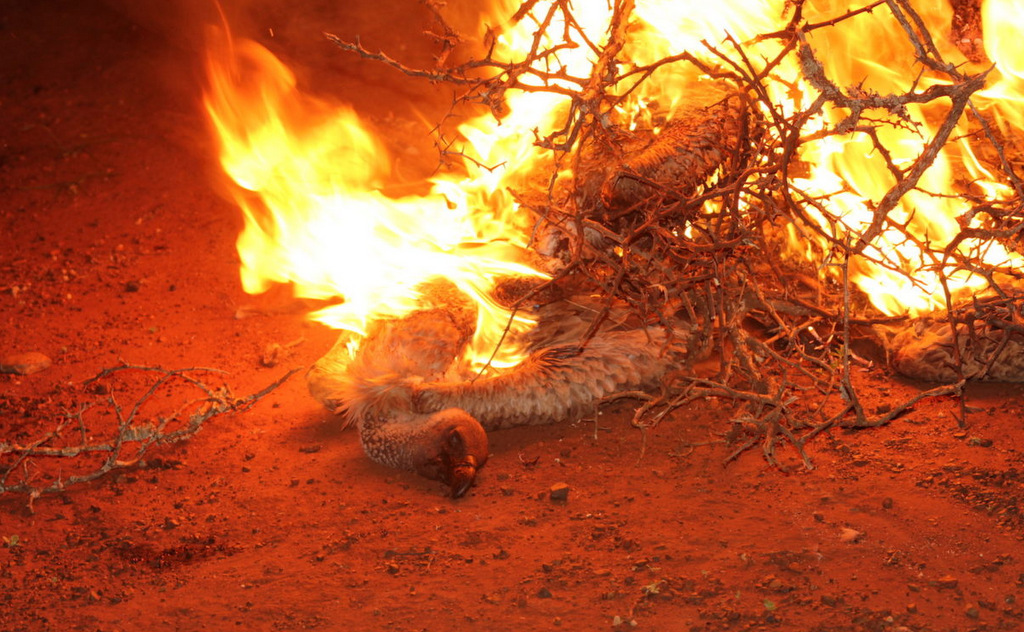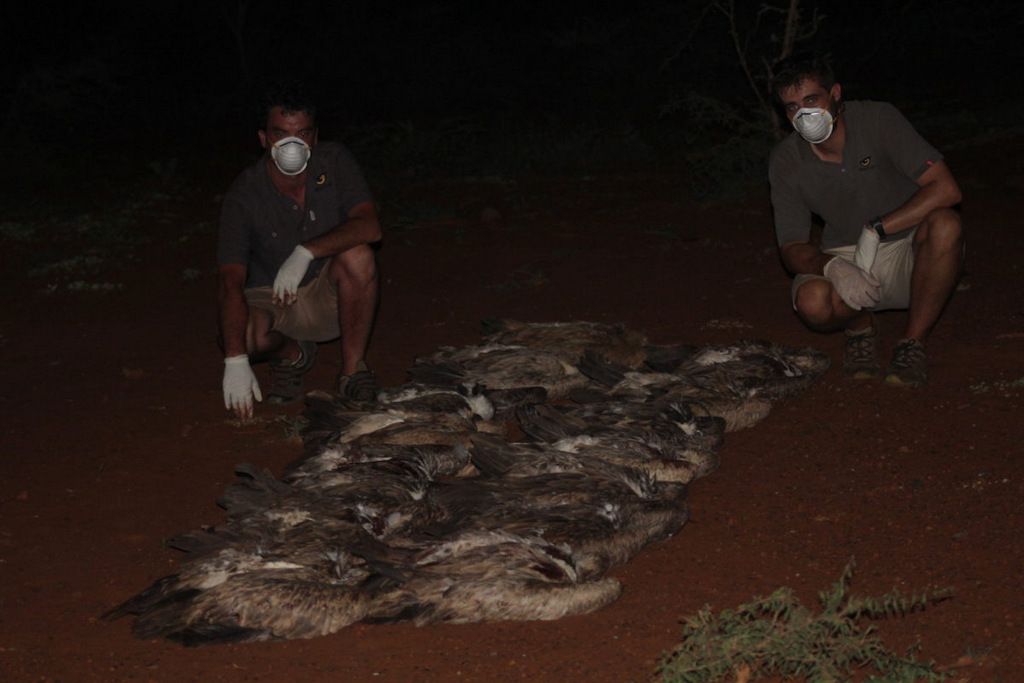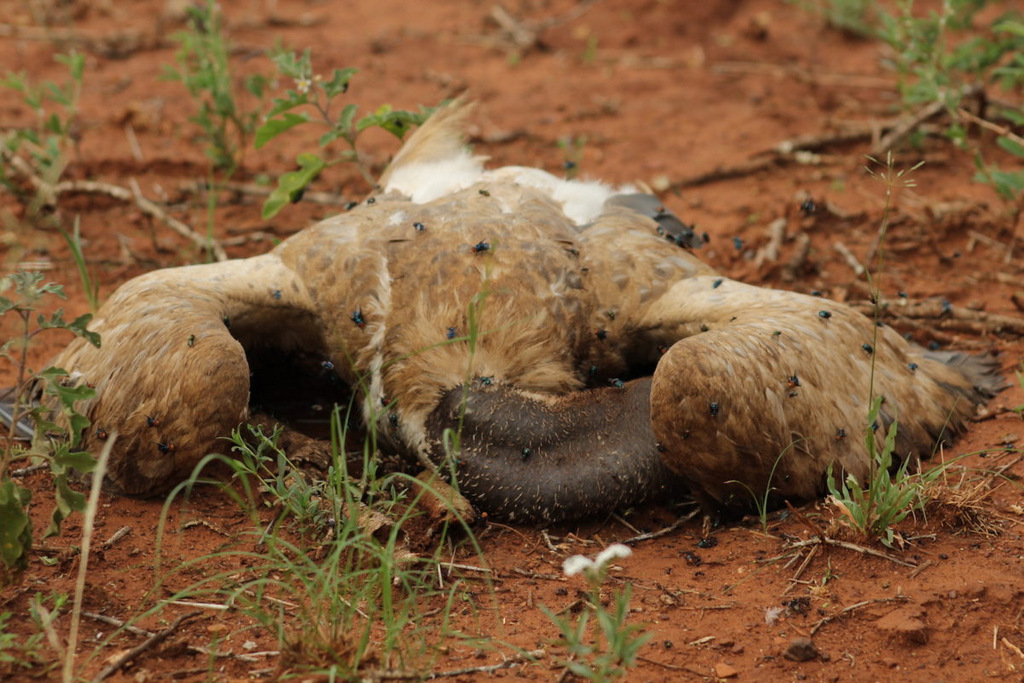
NEWS DESK POST by Fred Kockott, for Mongabay
Just two days before Christmas a mass vulture poisoning incident was discovered by the Wildlife ACT rangers in the South African province of KwaZulu-Natal, sparking warnings that the region’s diminishing vulture populations could face extinction unless the root cause of the killings is addressed.
On 23rd December, rangers found fifteen white-backed vultures (Gyps africanus) as well as a young lappet-faced vulture (Torgos tracheliotos) who all died after feeding on a poison-laced impala carcass in northern Zululand. It is the fourth vulture poisoning incident in the province this year, bringing the total recorded number of vultures harvested for body parts in this region alone to 53.
“Arriving at a scene like this with everything so fresh, but too late to assist in saving any poisoned birds is heartbreaking. Losing one vulture is always a tragedy. Losing at least 16 birds at one feeding is a crisis,” said PJ Roberts, manager of Wildlife ACT’s Emergency Response Team.
Wildlife ACT works closely with Ezemvelo KZN Wildlife, local farmers and communities, and other conservation groups to protect three endangered vulture species in KwaZulu-Natal.
Signs that the vulture poisoning was deliberate were immediately apparent after inspection of the first bird they came across, a white-backed vulture. “It had a full crop (still containing undigested food), contorted feet and many dead flies were scattered around its remains – all clear signs of fast-acting poison,” said Roberts.
The team swept the area, but it took an aerial search to locate more victims. “No more than 30 metres away, the morbid discovery of 13 processed and harvested white-backed vultures, with their heads and feet removed, were found very purposefully hidden in a thick bush,” added Roberts.
All of the contaminated carcasses were burned by the rangers to remove the poison from the ecosystem.

The Endangered WildLife Trust’s (EWT) Vultures for Africa Programme manager, Andre Botha, said it was difficult to quantify how many vulture poisoning incidents relate to harvesting of body parts. According to records kept by EWT, more than 1,200 vultures have been deliberately poisoned in Southern and Eastern Africa this year. Culprits include poachers who poison the carcasses of elephant and other game in an apparent effort to conceal illegal activities from rangers. These poisonings are referred to as “sentinel poisonings”, as vultures circling over poached animals alert rangers to the killings.
Africa’s vulture populations have already declined by an average 62% over the past three decades — with seven species crashing by 80%.
In Africa vultures are under threat due to habitat loss, ingestion of lead ammunition, collisions with power lines, accidental drownings in farm water reservoirs, and the use of poisoned bait by livestock owners to kill predators like jackals. Vultures feeding off the carcasses subsequently die, often in significant numbers.
But many more are poisoned deliberately to harvest body parts for belief-based use.
“The vultures are killed for their heads and feet and other parts,” said Chris Kelly, a species director at Wildlife ACT. “This is definitely the single biggest threat to diminishing vulture populations in this province.”
In many parts of Africa, vultures are believed to have psychic powers, including an ability to see into the future. According to a fact sheet from EWT, the brains of the bird are dried, rolled and smoked as joints or simply burnt and the fumes inhaled. Users believe this improves their odds when they gamble on the lottery or place bets on sport. Students take it when preparing for exams. Other reported uses of vultures include consuming their eyes to improve eyesight, their beaks for protection, or their feet to heal fractured bones or make a person run faster.

In 2014, EWT estimated that 130,000 traders, hunters and traditional healers were operating in South Africa. This figure is believed to have increased, sparking calls from conservationists, environmental scientists and wildlife experts at this year’s Conservation Symposium for an awareness-building campaign to reduce this consumption and demand for vulture parts.
“Vultures provide critically important ecosystem services by cleaning up carcasses thus reducing the spread of dangerous diseases such as anthrax and rabies and resulting in highly significant economic and human health benefits,” said Brent Coverdale, an animal scientist for Ezemvelo KZN Wildlife at the symposium. “We really can’t afford to lose them.”
As vultures are protected by law, it is illegal to possess or kill any of the six vulture species found in South Africa. Nevertheless, deliberate killings continue.

Citation: Ogada, D., Shaw, P., Beyers, R. L., Buij, R., Murn, C., Thiollay, J. M., … Sinclair, A. R. E. (2015). Another continental vulture crisis: Africa’s vultures collapsing toward extinction. Conservation Letters. https://doi.org/10.1111/conl.12182
To comment on this story: Login (or sign up) to our app here - it's a troll-free safe place 🙂.![]()






